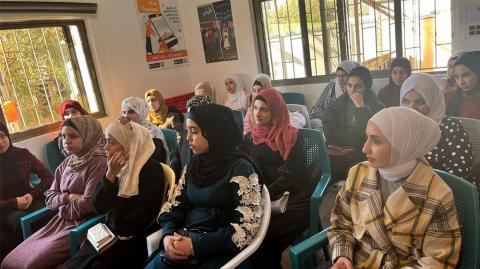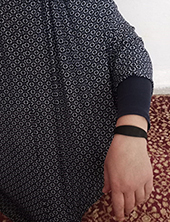
Imagine having your period, but lacking access to the tools and knowledge to manage it in a safe and healthy way, including proper menstrual products and methods to dispose of them, clean and private water facilities for personal care, and even basic health education about what is happening to your body. Imagine this repeated on average every month, for years. This is the case for many of the 300 million women and girls worldwide who are menstruating on any given day and who, depending on several intersecting factors that impact their lives, may also be confronted by period poverty.
Worldwide, an estimated 500 million people lack access to menstrual products and adequate facilities for menstrual health - however, menstrual health is key in ensuring that individuals have control over their bodies and can make informed decisions about their reproductive health. In the Arab region, gender inequality, discriminatory social norms, cultural taboos, poverty, and lack of basic services affect girls’ and women’s lives and their ability to meet their menstrual health and hygiene needs in a dignified manner. Jordan is no exception to this, with widespread challenges that women and girls face in accessing quality sanitary products, stigma-free information on menstruation and adequate WASH facilities. Girls with disabilities are at a further disadvantage in terms of accessing menstrual products and healthcare services - their reproductive health is frequently deprioritized within their households, at times resorting to extreme solutions such as hysterectomies to relieve parents, often left without information and support, from the concerns of having to deal with their daughters’ periods.
In Jordan UNFPA strives to improve menstrual health for the most vulnerable refugees and host communities. Aya[1] is a 14 years old Jordanian girl living in Amman who attended an initiative launched in 2022 in the capital city, as well as Madaba and Karak, coupling awareness raising sessions on physical changes during puberty and menstruation with cash assistance. In partnership with the mobile company Umniah, UNFPA’s implementing partner loaded electronic bracelets with small amounts and distributed them to the sessions’ participants to be used in shops for the purchase of menstrual products.
“I learnt many important things about what happens to my body during that time of the month, and useful tips on which products to use”, Aya said. She is still shy when it comes to talking about menstruation - the stigma around it is strong and it weighs over women and girls’ ability to discuss period issues openly. In Jordan many girls and women do not feel comfortable saying that they are going through the menstrual cycle - some pretend to continue exercising their daily activities normally despite the pain and the exhaustion they are feeling while others try to conceal period pain saying they suffer stomach ache or types of pain in other body parts.

UNFPA’s initiative targeted both adolescent girls and their parents, in order to counter with adequate education and awareness about menstruation the myths and misconceptions surrounding periods that feed into harmful taboos. Parents play a key role in raising awareness about menstruation and in reducing or enhancing feelings of shame or embarrassment. Fatima, Aya’s mother, was very happy about the possibility for her daughter and herself to benefit from the sessions and the economic assistance to buy pads “My husband did not bring any pad for me and our four daughters, he always said these items are not important since we can use any piece of fabric, and that we should not buy any specific soap from the market but use the generic multi-use one sold in bulk, which is of very bad quality”.
Sanitary pads are not affordable for everyone and the household’s financial situation is one of the main factors impacting women and girls ability to access good quality products - “As a mother with four daughters and not being able to provide for their needs I try to give them any piece of fabric, but that made me very sad as I was afraid it would affect their bodies'', Fatima said. Trading quality for the price is not the only possible implication of period poverty though - in particularly vulnerable situations, like that of Fatima and Aya’s family, the economic burden of menstrual health management can have even more extreme implications, like early marriage. Fatima admitted that, as she could not save enough money to cover the menstrual health needs for her and all her daughters, this contributed to her decision to marry off the eldest two daughters under 18 years old. In addition to the limitations that the husband imposed on the purchase of pads, they also could not take showers as they had neither soap nor the authorization to use the heater to warm up water.
One time one of my daughters went to school without pads, she was using pieces of fabric, and she was found with a stain of blood on her uniform. The school called me and when I arrived my daughter started crying and blamed me because she could not have pads like her friends - I felt very bad at that time.
Fatima, one of the mothers attending the MHM awareness sessions and receiving conditional cash assistance to purchase MH products
Through the sessions supported by UNFPA Fatima could learn about health repercussions of using bad quality menstrual products and could start buying pads and soap, but she is concerned about the end of the assistance as she and the two daughters still living with her will have to revert back to using the previous cheap and poor quality items amidst. She also cannot rely on her husband’s support - contrary to other fathers who attended awareness sessions organized to shed a light on menstrual health and facilitate the breaking of the stigma surrounding periods, Aya’s father refused to participate. Menstrual health however is not just a women's issue, men and boys should join the conversations about it as this will encourage positive attitudes towards menstruation. As shown by the complexities around Fatima and Aya’s menstrual health management, both at the individual and household level, sustained efforts to implement comprehensive approaches combining scientific education with infrastructure, access to products and strategies to tackle stigma and taboos surrounding the issue are pivotal in ensuring that menstruation is a healthy, normalized and shame-free experience and that no woman or girl is prevented from accomplishing her potential due to her menstrual period.
[1] Both Aya and Fatima’s names have been changed to protect their privacy.


